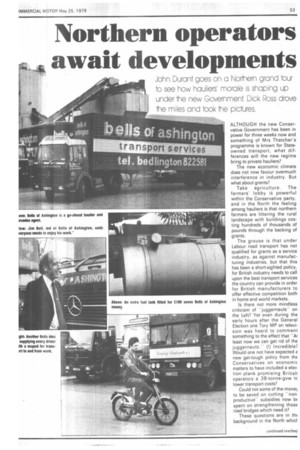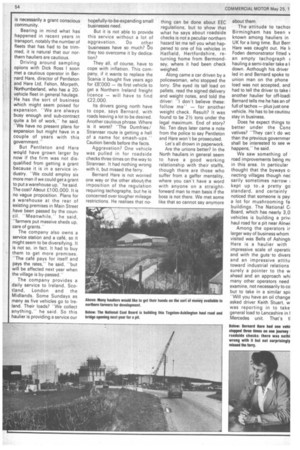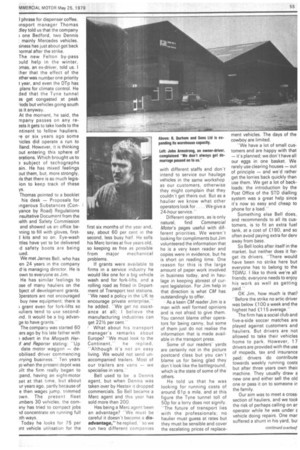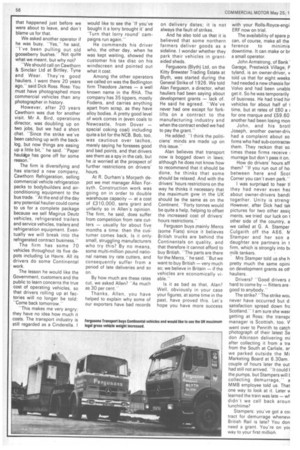Northern operators await developments
Page 55

Page 56

Page 57

Page 58

If you've noticed an error in this article please click here to report it so we can fix it.
John. Durant goes on a No err) grand tour to see how hauliers' morale is shaping up under the new Government Dick Ross drove the miles and took ne pictures.
ALTHOUGH the new Conservative Government has been in power for three weeks now and something of Mrs Thatcher's programme is known for State owned transport, what differences will the new regime bring to private hauliers?
The new economic climate does not now favour overmuch interference in industry. But what about grants?
Take agriculture. The farmers' lobby IS powerful within the Conservative party, and in the North the feeling among hauliers is that northern
farmers are littering the rural landscape with buildings costing hundreds of thousands of pounds through the backing of grants.
The grouse is that under Labour road transport has not qualified for grants as a service industry, as against manufacturing industries, but that this has been a shortsighted policy, for British industry needs to call upon the best transport services
the country can provide in order for British manufacturers to offer effective competition both in home and world markets.
Is there not more mindless criticism of "juggernauts" on the Left? Yet even during the early hours after the General Election one Tory MP on televi sion was heard to comment something to the effect that "Al least now we can get rid of the juggernauts." (I) Incredible?
Would one not have expected 2 new get-tough policy from the
Conservatives on economic matters to have included a elec. ton plank promising British operators a 38-tonne-gvw tc lower transport costs?
Could not some of the mone) to be saved on cutting "non productive" subsidies now bc spent on strengthening thosE road bridges which need it?
These questions are in thE background in the North which is necessarily a grant conscious community.
Bearing in mind what has happened in recent years in transport, notably the number of fleets that has had to be trimmed, it is natural that our northern hauliers are cautious.
Driving around sampling opions with Dick Ross I soon met a cautious operator in Bernard Hare, director of Pentleton and Hare Ltd, Felton, Morpeth, Northumberland, who has a 20vehicle fleet in general haulage. He has the sort of business which might seem poised for expansion. ''We are always busy enough and sub-contract quite a bit of work," he said. "We have no present plans for expansion but might have in a couple of years with this government."
But Pentleton and Hare would have grown larger by now if the firm was not disqualified from getting a grant because it is in a service industry. We could employ six more men if we could get a grant to put a warehouse up," he said. The cost? About £100,000. It is no vague proposition. Plans for a warehouse at the rear of existing premises in Main Street have been passed by the council. "Meanwhile," he said, "farmers put massive sheds up, care of grants."
The company also owns a service station and a café, so it might seem to be diversifying. It is not so, in fact. It had to buy them to get more premises. "The café pays for itself and pays the rates," he said, "but will be affected next year when the village is by-passed."
The company provides a daily service to Ireland, Scotland, London and the Midlands. Some Sundays as many as five vehicles go to Ireland. Their loads? "We collect anything," he said. So this haulier is providing a service our hopefully-to-be-expanding small businesses need.
But it is not able to provide this service without a lot of aggravation. Do other businesses have so much? to they too overcome it by dedication?
They all, of course, have to cope with inflation. This company, if it wants to replace the Scania it bought five years ago for £8000 — its first vehicle to get a Northern Ireland freight licence — will have to find £22,000.
Its drivers going north have to cope, says Bernard, with roads leaving a lot to be desired. Another cautious phrase. Where is it worst? "The Dumfries/ Stranraer route is getting a hell of a name for smash-ups." Caution bends before the facts.
Aggravation? One vehicle was pulled in for roadside checks three times on the way to Stranraer. It had nothing wrong with it, but missed the ferry.
Bernard Hare is not worried one way or the other about/the imposition of the regulation requiring tachographs, but he is concerned over tougher mileage restrictions. He realises that no
thing can be done about EEC regulations, but to show that what he says about roadside checks is not a peculiar northern hazard let me tell you what happened to one of his vehicles in Hatfield, Hertfordshire, returning home from Bermondsey, where it had been check weighed.
Along came a car driven by a policewoman, who stopped the lorry. She eyed its tallload on pallets, read the signed delivery and weight notes, and told the driver: "I don't believe these: follow me" — for another weight check. Result? It was found to be 21/2 tons under the legal maximum. End of story? No. Ten days later came a note from the police to say Pentleton and Hare won't be prosecuted.
Let's all drown in paperwork.
Are the unions better? In the North hauliers in general seem to have a good working relationship with their staffs, though there are those who suffer from a gaffer mentality, where you can't have a word with anyone on a straightforward man to man basis if the boss is not there. We met some like that so cannot say anymore about them.
The attitude to tachoE Birmingham has been v known among hauliers in UK for a long time. But Berr Hare was caught out. He I( Foden demonstrator fitted v an empty tachograph hauling a semi-trailer take a I down. Aothough his driver led in and Bernard spoke to union man on the phone load was not accepted, and had to tell the driver to take i another haulier for off-loadi Bernard tells me he has an of full of tachos — plus just one vehicle. He has to be cautiou stay in business.
Does he expect things to better under the ConE vatives? "They can't do wc than the previous governmer shall be interested to see w happens," he said.
We saw something of road improvements being mi in this area. In particular thought that the byways c, necting villages though nec sarily sometimes narrow , kept up to. a pretty go standard, and certainly noticed that someone is pay a lot for mushrooming fa buildings. The National C, Board, which has nearly 3,0 vehicles is building a priv haul road for a pit near Alnwi Among the operators ir larger way of business whom visited was Bells of Ashingtc Here is a haulier with impressive scale of operatic and with the guts' to divers and an impressive attitu toward industrial relations surely a pointer to the w ahead and an approach whi many other operators need examine, not necessarily to co but to take in a similar spi, -Will you have an oil change asked driver Keith Stuart, w was reporting in to take general load to Lancashire in I Mercedes unit. That's ti
I phrase for dispenser coffee. insport manager Thomas Jley told us that the company ; one Bedford, two Dennis : mainly Mercedes vehicles. 3iness has just about got back iormal after the strike.
The new Felton by-pass ould help in the winter, ornas, an ex-driver, told us. I her that the effect of the 3ther was number one priority t year, and even the DTp has plans for climate control. He led that the Tyne tunnel
es get congested at peak -iods but vehicles going south 3S it anyway.
At the moment, he said, the mpany passes on any re nts it gets to take loads to the ntinent to fellow hauliers. re or six years ago some
-ides did operate a run to
hand. However, it is thinking out entering this sphere of ?rations. Which brought us to ? subject of tachographs am. He has mixed feelings out them, but, more strongly, Is that there is so much legision to keep track of these vs.
Thomas pointed to a booklet his desk — Proposals for ingerous Substances (Con yance by Road) Regulations nsultative Document from the ialth and Safety Commission and showed us an office be
-ming to fill with gloves, firstI kits and so on. Eye-wash
ttles have yet to be delivered d safety boots are being ;ued.
We met James Bell, who has en 24 years in the company oils managing director. He is own to everyone as Jim.
He has similar feelings to ase of many hauliers on the bject of development grants.
)perators are not encouraged buy new equipment; there is grant even for fork-lifts so iuliers tend to use second incl. It would be a big advange to have grants."
The company was started 60 ,ars ago by his late father with advert in the Morpeth Her
d and Reporter stating: "Up date motor waggon — deobilised driver commencing Trying business.' Ten years 10 when the present depot was Jilt the firm really began to :pand, having an eight-motor 3et at that time, but about ur years ago, partly because of e then wages jump, trimmed
own. The present fleet Jmbers 30 vehicles; the cornany has tried to compact jobs Id concentrate on running full oth ways.
Today he looks for 75 per :nt vehicle utilisation for the first six months of the year and, say, about 60 per cent in the second, less busy half. He sells his Merc lorries at five years old, so keeping as free as possible from major mechanical problems.
If grants were available to firms in a service industry he would like one for a big vehicle wash and for fork-lifts, and a rolling road as fitted in Department of Transport test stations. "We need a policy in the UK to encourage private enterprise," he added. "We get no assistance at all; I believe the manufacturing industries can get 221/2 per cent.'"
What about his transport manager's remarks about Europe? "We must look to the Continent," he replied, "Although it's not an easy living. We would not send unaccompanied trailers, Most of our trailers are vans — we specialise in vans."
Bell used to be a Dennis agent, but when Dennis was taken over by Hestair it dropped commercials. So Bell became a Mere agent and this year has sold more than 200.
Has being a Merc agent been an advantage? "We must be careful it doesn't become a disadvantage," he replied. -so we run two different companies
with different staffs and don't intend to service our haulage vehicles in the same workshop as our customers, otherwise they might complain that they couldn't get theirs out. But as a haulier we know what other operators look for. . . . We give a 24-hour service."
Different operators, as is only
natural, find Commercial Motor's pages useful with different priorities. We weren't looking for compliments but Jim volunteered the information that he is a very keen reader and copies were in evidence, but he is short on reading time. One reason for this is the large amount of paper work involved in business today, and in haulage in keeping abreast of current legislation. For Jim help in that direction is what CM has outstandingly to offer.
As a keen CM reader Jim is a man with well formed opinions and is not afraid to give them. You cannot blame other operators for being canny, but some of them just do not realise the information that is made available in the transport press.
Some of our readers' yards are certainly not in the picture postcard class but you can't blame us for being glad they don't look like the battleground, which is the state of some of the others.
He told us that he was looking for running costs of around 61p a mile, and at this figure the Tyne tunnel toll of 50p for a lorry does not signify. "The future of transport lies with the professionals; no haulier must guess at rates but they must be sensible and cover the escalating prices of replace
ment vehicles. The days of the cowboy are limited.
"We have a lot of small customers and are happy with that — it's planned; we don't have all our eggs in one basket. We rarely use clearing houses — out of principle — and we'd rather get the lorries back quickly than use them. We get a lot of backloads; the introduction by the Post Office of the STD dialling system was a great help since it's now so easy and cheap to phone for a load."
Something else Bell does, and recommends to all its customers, is to fit an extra fuel tank, at a cost of £180, and so often avoid paying extra for dery away from base.
So Bell looks after itself in the market, but neither does it forget its drivers. "There would have been no strike here but everyone has to belong to the TGWU. I like to think were all friends; everyone needs to enjoy his work as well as getting paid."
OK Jim, how much is that? "Before the strike no artic driver was below El 00 a week and the highest had El 15 average."
The firm has a social club and five-a-side soccer matches are played against customers and hauliers. But drivers are not allowed to take their vehicles home to park. However, 17 drivers are provided with the use of mopeds, tax. and insurance paid; drivers do contribute towards weekly running costs but after three years own their machine. They usually draw a new one and either sell the old one or pass it on to someone in the family.
Our aim was to meet a cross. section of hauliers, and we took the risk of perhaps calling on ar operator while he was under E vehicle doing repairs. One mar suffered a shunt in his yard, bui that happened just before we were about to leave, and don't blame us for that.
We asked another operator if he was busy. "Yes," he said, "I've been pulling out old gooseberry bushes." Not quite what we meant, but why not "We should call on Cawthorn & Sinclair Ltd at Birtley, Tyne and Wear. They're good hauliers. I went there 20 years ago,"' said Dick Ross. Ross: You must have photographed more commercial vehicles than any photographer in history.
However, after 20 years Cawthorn was due for another visit. Mr A. Bird, operations director, was doubling up on two jobs, but we had a short chat. "Since the strike we've been catching up with the backlog, but now things are easing up a little bit," he said. -Paper haulgge has gone off for some reason."
The firm is diversifying and has started a new company, Cawthorn Refrigeration, selling commercial vehicle refrigeration packs to bodybuilders and airconditioning equipment to the bus trade. "At the end of the day any potential haulier could come to us for a complete package because we sell Magirus Deutz vehicles, refrigerated trailers and service vehicles, trailers and refrigeration equipment. Eventually we will break into the refrigerated contract business."
The firm has some 70 vehicles throughout its five depots including Le Havre. All its drivers do some Continental work.
The lesson he would like the Government, customers and the public to learn concerns the true cost of operating vehicles, so that drivers rolling up at factories will no longer be told: -Come back tomorrow."
''This makes me very angry; they have no idea how much it costs. The transport industry is still regarded as a Cinderella. I would like to see the 'If you've bought it a lorry brought it' and 'Turn that lorry round' campaigns run again."
He commends his driver who, the other day, when he was kept waiting, showed the customer his tax disc on his windscreen and pointed out what it cost.
Among the other operators we called on was the Bedlington firm Theodore James — a well known name in the RHA. The company has 35 tippers, mostly Fodens, and carries anything apart from scrap, as they have alloy bodies. A pretty good level of work comes in (even coals to Newcastle, from Dover — special coking coal) including quite a bit for the NCB. Bob, too, was cautious over tachos, merely saying he foresees good and bad points, and that drivers see them as a spy in the cab, but he is worried at the prospect of further restrictions on drivers' hours.
At R. Durham's Morpeth depot we met manager Allen Forsyth. Construction work was going on in order to double warehouse capacity — at a cost of £310,000, sans grant and unfairly so in Allen's opinion. The firm, he said, does suffer from competition from rate cutters — usually for about five months a time: then the custumer comes back, Is it only. small, struggling manufacturers who try this? By no means, some multi-million pound national names try rate cutters, and consequently suffer from a period of late deliveries and so on.
By how much are these rates cut, we asked Allen? "As much as 30 per cent."
Thanks, Allen, you have helped to explain why some of our exporters have bad records on delivery dates; it is not always the fault of strikes.
And he also told us that it is believed that some northern farmers deliver goods as a sideline, I wonder whether they park their vehicles in grantaided sheds.
Fergusons (Blyth) Ltd, on the Kitty Brewster Trading Estate at Blyth, was started during the General Strike of 1926. We told Alan Ferguson, a director, what hauliers had been saying about development grants — lack of. He said he agreed. "We've never had one except for forklifts on a contract to the manufacturing industry and when the contract ended we had to pay the grant.
He added: "I think the politicians' minds are made up on this issue.'" Alan believes that transport now is bogged down in laws; although he does not know how to recommend that it should be done, he thinks that some should be relaxed. And with the drivers' hours restrictions on the way he thinks it necessary that the maximum gvw in the UK should be the same as on the Continent. "Forty tonnes would be quite a help, helping to offset the increased cost of drivers' hours restrictions."
Ferguson buys mainly Mercs (some Fiats) since it believes British trucks are behind the Continentals on quality, and that therefore it cannot afford to buy British. -The parts are there for the Mercs," he said. "But we want to buy British — very much so; we believe in Britain — if the vehicles are economically viable."
Is it as bad as that, Alan? Well, obviously in your case your figures, at some time in the past, have proved this. Let's hope you have more success with your Rolls-Royce-engi ERF now on trial.
The availability of spare p can, of course, make all the ference to minimis downtime. It can make or br a small operator.
John Armstrong, of Bank Garage, Prestwick Village, P tyland, is an owner-driver, v told us that for eight weeks had needed a new chassis for Volvo and had been unable get it. So he was temporarily of business. He had tried hir vehicles for about half of I time, but at rates of £60 a ( for one marque and .£59.60 another had been losing mon
John, and his brotl Joseph, another owner-drib had a complaint about so firms who had sub-contracte( them. They reckon that so times these firms receive murrage but don't pass it on.
How do drivers' hours aff them? "If you run out of ho between here and Scot Corner you can't even park.
I was surprised to hear ti they had never even he about owner-drivers bandi together. Unity is streng• However, after Dick had tak pictures for two other assic. ments, we tried our luck on other side of the country, a we called at G. A. Stamper Culgaith off the A66. N Stamper and her son a daughter are partners in t firm, which is strongly into bt milk tankers.
Mrs Stamper told us she h pretty much the same opini on development grants as otlhauliers.
Drivers? "Good drivers e hard to come by — flitters are good to anybody."
The strike? "The strike wou never have occurred but d, satisfaction spread down fro Scotland." I am sure she wasr getting at Ross; the transpc manager is Scottish, too. V went over to Penrith to catch photograph of their latest Se don Atkinson delivering mi after collecting it from a tra from the South at Carlisle, ar we parked outside the Mi Marketing Board at 6.30am. couple of hours later the out had still not arrived. "It could k the pumps, but Stampers will collecting demurrage," a MMB employee told us. That one way to look at it. Later +A learned the train was late — wldidn't we call back aroun lunchtime?
Stampers: you've got a col tract for demurrage whenev( British Rail is late? You don need a grant. You're on yot way to your first million.




























































































































